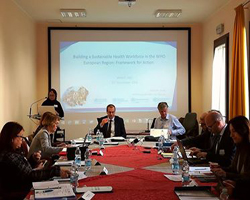Expert meeting on human resources for health in small countries in the WHO European Region

WHO
29-01-2019
For health systems to work, health workers are essential. Improving health-service coverage and realizing the right of the population to enjoy the highest attainable standard of health depends not only on the mere availability of health workers, but also on their accessibility, acceptability and quality. Only when they possess the required competences to deliver quality care, and only when their services are equitably distributed and adequately supported by the health system so that they are able to deliver such care according to the sociocultural expectations of the population, can theoretical service coverage translate into effective service coverage. How can these challenges be addressed in small countries?
On 18–19 December 2018, experts from the eight countries participating in the Small Countries Initiative (Andorra, Cyprus, Iceland, Luxembourg, Malta, Monaco, Montenegro and San Marino) with populations of under one million, and from three countries with populations of between one and two million (Estonia, Latvia and Slovenia) met with WHO experts in Venice, Italy, to discuss an integrated approach to addressing the challenges that small countries face in building sustainable, resilient health workforces. Since small islands are dealing with similar issues, the Autonomous Region of Madeira (Portugal) was also represented at the meeting.
According to two milestone documents – the “Global strategy on human resources for health: workforce 2030” and “Towards a sustainable health workforce in the WHO European Region: framework for action” – strengthening the health workforce involves addressing many issues. These include: supply–demand imbalance; gender inequality/imbalances; need for an appropriate skills’ mix; geographical maldistribution; risks of, or reliance on, health-worker migration; gaps in competences/quality of care; inadequate working conditions; and recruitment and retention levels.
In assessing and developing effective policy responses to Human Resources for Health (HRH) challenges in small countries, their specific and unique characteristics in the context of size and dynamics, need to be taken fully into account.
The WHO European Office for Investment for Health and Development, Venice, Italy, of the WHO Regional Office for Europe, hosted the expert meeting, which was co-moderated by: Hans Kluge, Director, Division of Health Systems and Public Health; Gabrielle Jacob, Programme Manager, Jim Buchan, WHO Consultant, HRH Programme, WHO Regional Office for Europe; and Natasha Azzopardi-Muscat, President of the European Public Health Association, Consultant in the Ministry of Health of Malta and Senior Lecturer at the Department of Health Services Management at the University of Malta where she jointly heads the WHO Collaborating Centre on Health Systems and Policies in Small States.
The meeting provided an opportunity to examine the approaches of small countries in the Region to HRH challenges through policy analysis and implementation across four domains:
- transforming education and performance;
- aligning planning and investment;
- building capacity;
- improving analysis and monitoring.
The focus was on identifying the most pronounced challenges, as well as good (or promising) policy on tackling them. The participants shared examples of planning and practical measures taken in their countries. The scope for further knowledge exchange was examined and priorities for future action were defined.
The report containing the recommendations of this expert meeting will be presented in a session dedicated to HRH at the Sixth high- level meeting of small countries, which will take place in San Marino on 31 March–2 April 2019.
In addition, the results of the meeting will provide the basis for developing a supplement to the “Toolkit for a Sustainable Health Workforce in the WHO European Region” (2018) on HRH challenges and solutions in small countries.



